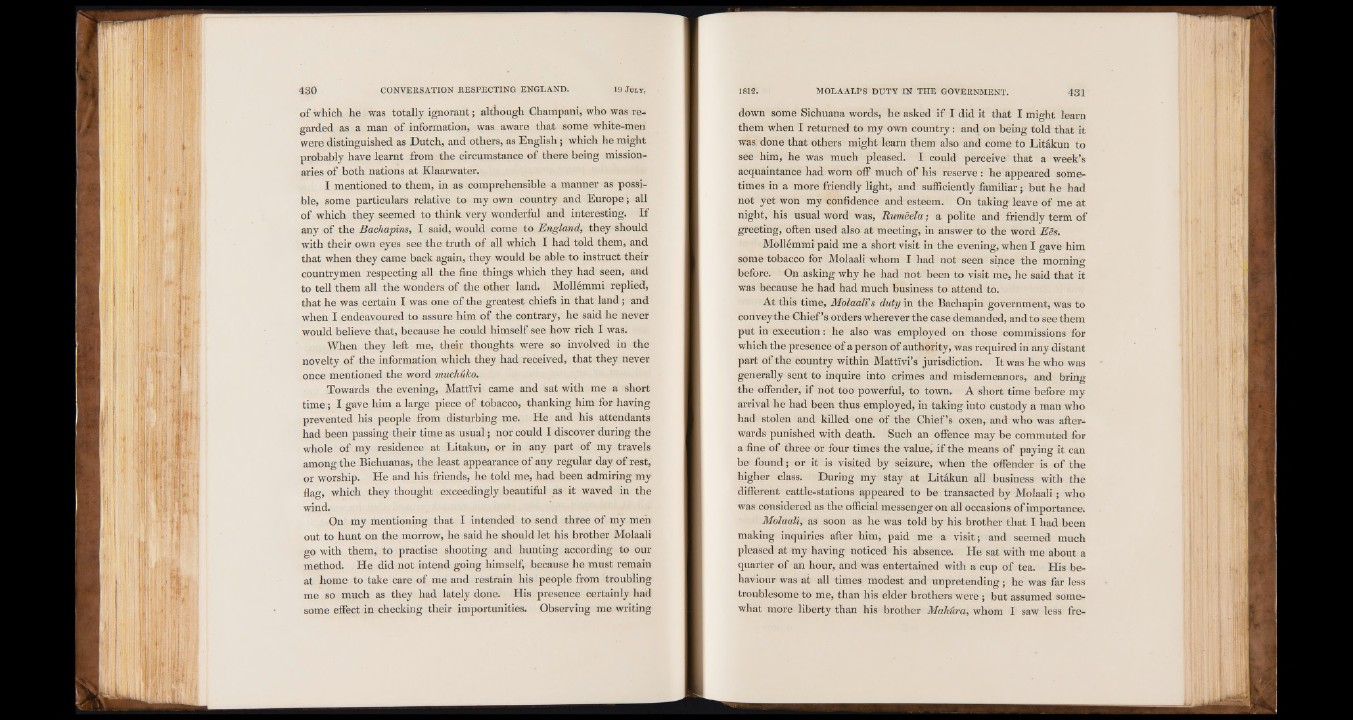
of which he was totally ignorant; although Champani, who was regarded
as a man of information, was aware that some white-men
were distinguished as Dutch, and others, as English; which he might
probably have learnt from the circumstance of there being missionaries
of both nations at Klaarwater.
I mentioned to them, in as comprehensible a manner as possible,
some particulars relative to my own country and Europe; all
of which they seemed to think very wonderful and interesting. If
any of the Bachapins, I said, would come to England, they should
with their own eyes see the truth of all which I had told them, and
that when they came back again, they would be able to instruct their
countrymen respecting all the fine things which they had seen, and
to tell them all the wonders of the other land. Mollemmi replied,
that he was certain I was one of the greatest chiefs in that land; and
when I endeavoured to assure him of the contrary, he said he never
would believe that, because he could himself see how rich I was.
When they left me, their thoughts were so involved in the
novelty of the information which they had received, that they never
once mentioned the word muchuko.
Towards the evening, Mattivi came and sat with me a short
tim e; I gave him a large piece of tobacco, thanking him for having
prevented his people from disturbing me. He and his attendants
had been passing their time as usual; nor could I discover during the
whole of my residence at Litakun, or in any part of my travels
among the Bichuanas, the least appearance of any regular day of rest,
or worship. He and his friends, he told me, had been admiring my
flag, which they thought exceedingly beautiful as it waved in the
wind.
On my mentioning that I intended to send three of my men
out to hunt on the morrow, he said he should let his brother Molaali
go with them, to practise shooting and hunting according to our
method. He did not intend going himself, because he must remain
at home to take care of me and restrain his people from troubling
me so much as they had lately done. His presence certainly had
some effect in checking their importunities. Observing me writing
down some Sichuana words, he asked if I did it that I might learn
them when I returned to my own country: and on being told that it
was done that others might learn them also and come to Litákun to
see him, he was much pleased. I could perceive that a week’s
acquaintance had worn off much of his reserve : he appeared sometimes
in a more friendly light, and sufficiently familiar; but he had
not yet won my confidence and esteem. On taking leave of me at
night, his usual word was, Rumeela; a polite and friendly term of
greeting, often used also at meeting, in answer to the word Ees.
Mollémmi paid me a short visit in the evening, when I gave him
some tobacco for JMolaali whom I had not seen since the morning
before. On asking why he had not been to visit me, he said that it
was because he had had much business to attend to.
At this time, Molaali’s duty in the Bachapin government, was to
convey the Chief’s orders wherever the case demanded, and to see them
put in execution: he also was employed on those commissions for
which the presence of a person of authority, was required in any distant
part of the country within Mattlvi’s jurisdiction. It was he who was
generally sent to inquire into crimes and misdemeanors, and bring
the offender, if not too powerful, to town. A short time before my
arrival he had been thus employed, in taking into custody a man who
had stolen and killed one of the Chief’s oxen, and who was afterwards
punished with death. Such an offence may be commuted for
a fine of three or four times the value,’ if the means of paying it can
be found; or it is visited by seizure, when the offender is of the
higher class. During my stay at Litakun all business with the
different cattle-stations appeared to be transacted by Molaali; who
was considered as the official messenger on all occasions of importance.
Molaali, as soon as he was told by his brother that I had been
making inquiries after him, paid me a visit; and seemed much
pleased at my having noticed his absence. He sat with me about a
quarter of an hour, and was entertained with a cup of tea. His behaviour
was at all times modest and unpretending; he was far less
troublesome to me, than his elder brothers were; but assumed somewhat
more liberty than his brother Mahúra, whom I saw less fre